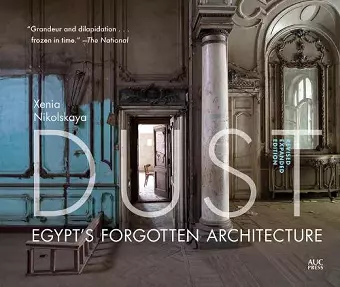Dust
Egypt's Forgotten Architecture, Revised and Expanded Edition
Format:Hardback
Publisher:American University in Cairo Press
Published:27th Sep '22
Should be back in stock very soon

A stunning photographic compilation of Egypt’s abandoned palaces and grand buildings
Between 1860 and 1940, Cairo and other large cities in Egypt witnessed a major construction boom that gave birth to extraordinary palaces and lavish buildings. These incorporated a mix of architectural styles, such as Beaux-Arts and Art Deco, with local design influences and materials. Today, many lie empty and neglected, rapidly succumbing to time, a real-estate frenzy, and an ongoing population crisis.
In 2006 Russian-born photographer Xenia Nikolskaya began the process of documenting these structures. She gained exceptional access to them, taking photographs at some thirty locations, including Cairo, Alexandria, Luxor, Minya, Esna, and Port Said. These photographs were documented in the first edition of Dust: Egypt’s Forgotten Architecture, which soon after its release in 2012 became a rare collector’s item.
This revised and expanded edition includes photographs from the first edition together with extra unseen images and new photographs taken by Nikolskaya between 2013 and 2021. It also includes previously unpublished essays by Heba Farid, co-owner of the Cairo-based photo gallery Tintera, and architect and urban planner Omar Nagati, co-founder of CLUSTER, an urban design and research platform also in Cairo.
Dust: Egypt's Forgotten Architecture leads us seductively into some of the most breathtaking architectural spaces of Egypt's recent past, filled with a sense of both the immense weight and the impermanence of history.
“Large, carefully composed and beautifully lit images”—Sunday Telegraph
“Stunning”—Plain Magazine
“Very arresting images”—BBC
“Extraordinary . . . The book documents the abandoned palaces and salons of an Egypt you don’t often see in the headlines: the golden age of Cairene opulence.”—Roads & Kingdoms
“Her painterly compositions and lambent lighting (which in most cases is natural) serve to give the impression that these are stage sets, only waiting for the arrival of the actors.”—Voyager
“Dramatic and haunting. . . . succeeds in capturing the glitz and glamor of a past century as a marzipan filling in dark chocolate, without staging her pictures in an overly sweet way. The illustrated book Dust: Egypt's Forgotten Architecture is thus a wonderfully delicate pastime.”—dis:orient Magazine
“Dust is not just a documentation of these fascinating architectural spaces, it also traces the idea of a typology of absence. . . Avoiding any kind of nostalgia, the book challenges its reader: going back to this Egyptian dust also takes us deep into our own expectations of life and notions of legacy. ”—The Global Journal
“Egypt’s most magnificent buildings have stood unloved–and unlooted–for decades. But a new book of photographs may change that.”—SEVEN
“Shot in natural light, empty and devoid of people, her images capture the almost eerie desolation. . . . What attracts us in the photos is the tension between the beautiful and the broken, where the passage of time becomes visible; and the patina, which gives man made things an air of the organic.”—Dixikon
“The Cairo [Nikolskaya] captures with her lens is a European city, its grandeur and dilapidation devoid of exotic oriental motifs and shown as somehow frozen in time.”—The National
“Nikolskaya brings these palaces back to life”—Egypt Today
“Dust explores the conditions and relevance of empty architectural spaces in Egypt, presenting an entwined dualism: dust as materiality that layers the city, literally tracing the passage of time upon urban objects – but also as a temporal metaphor that registers these changes on the level of memories, both past and present.”—Cairo 360
"Nikolskaya’s lens expertly captures an eerie forlornness in some of the places depicted in her book, most of which are rundown and ominous. However, what is perhaps most remarkable about her style is how she directs the viewer's eye to detail after detail, weaving a rich narrative."—The National
ISBN: 9781649031365
Dimensions: unknown
Weight: unknown
160 pages